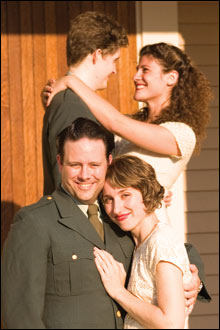
PERIOD PIECE Returning from war, men turn to love. |
Men return from war, and attentions turn to love: It's a timeless order, and so it is with the witty Sicilians of Shakespeare's comedy
Much Ado About Nothing. Except that the war in question is not some vague conflict of antiquity, in the Theater at Monmouth's production (under Jeri Pitcher's direction), but one in which we have much more emotional currency, the Second World War. The enormous cultural resonance of this war and this time period add thoughtful dimensions to a play in which the battling turns to love.
And so the show begins, grippingly, with sounds and images deeply familiar: A montage of radio broadcasters announcing the war's end, the uniformed men entering in silent formation, and finally their falling out into a giddy rush of whoops, amorous embraces, and frolicking to big band jazz. Although the set — the courtyard of a slightly crumbling villa, with fading angel frescos on the wall — also acknowledges a more distant past, director Pitcher's updating puts the characters in a highly recognizable and very recent historical memory of war.
It also provides a smart proto-feminist context for the crackerjack anti-marriage witticisms of Beatrice (Ambien Mitchell), who unlike the other women of the villa wears slacks and short hair. Mitchell's Beatrice is merry, buoyant, and sharp, and her tall, lean frame plays nicely against her foe-turned-lover Benedick (Jared Michael Delaney), who's a little on the short, soft side, and has an appealing touch of Vince Vaughn-style exasperated irony. The battle scenes between Beatrice and Benedick are great fun, though at moments the blocking feels a little static — the two of them downstage, everyone standing around watching them.
Getting the two of them together requires the benign deceits of Beatrice's uncle Leonato (Mark S. Cartier, jovially), along with the Prince, Don Pedro (Paul Bernardo), and Claudio (Andrew Krug), a bit of a square who is newly betrothed for Beatrice's cousin Hero (Janet McWilliams). Their elaborate trickery is carried out in two scenes rife with situational comedy, as they allow themselves to be "overheard" by Benedick and then Beatrice, who hide themselves in a series of slapstick gags.
As for the villain of the play, Don John (Dustin Tucker), who arranges for Hero's honor to be falsely slandered and her nuptials dashed, he too is given a fresh angle by the WWII setting. The illegitimate brother of the Prince, Don John wears fatigues to Don Pedro's general's uniform, making the status issue between them a more visceral dynamic. Even more strikingly, Tucker has given the villain a stutter — particularly at the word "brother" — and a physical bearing that to me immediately suggested shell-shock — or, in the modern parlance, PTSD. Tucker is normally cast almost exclusively in comic roles, and I am grateful and impressed to see him playing against type. Though the audience's first inclination was to give him a laugh, the tightly wound anguish and toxicity of his Don John has the pang of pathos to it, of deep-seated trauma. The idea that status grievances and the horrors of battle might have a hand in social malfeasance has implications indeed, and I would have liked to see their symptoms manifested in Don John even more.